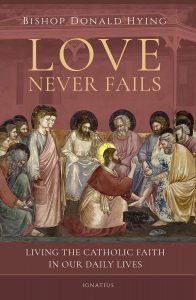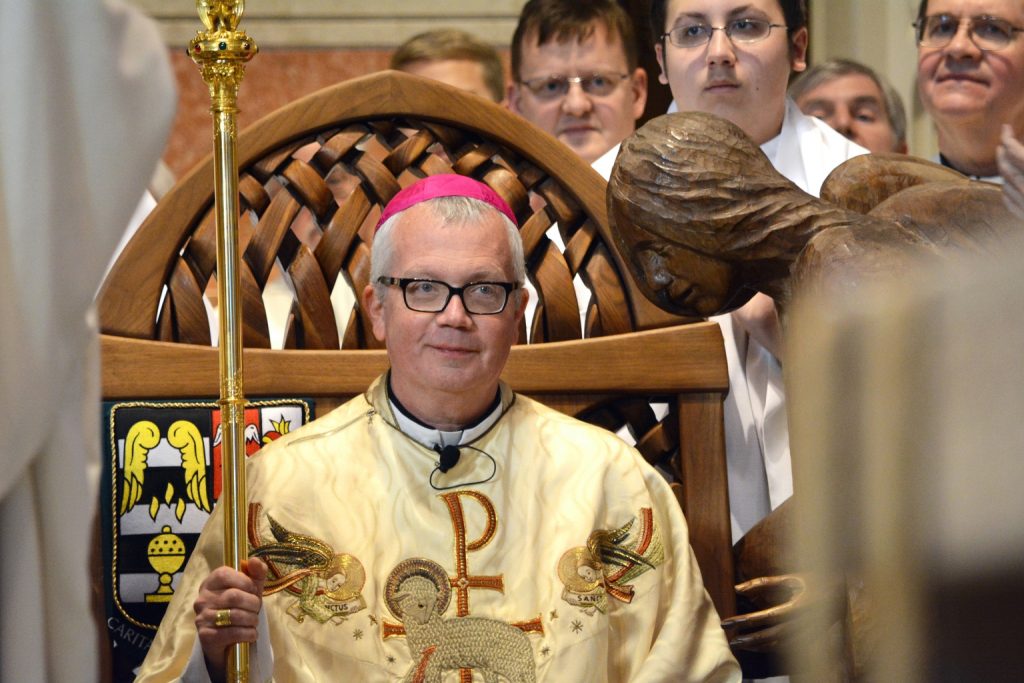“To turn off the television and the phone — these are probably two of the most sacred acts that we can perform for our own salvation and sanity,” Bishop Donald Hying, of Madison, Wisconsin, writes, in his new book, “Love Never Fails: Living the Catholic Faith in Our Daily Lives” (Ignatius Press, $16.95).
In a world full of distractions, disappointments, and otherwise depressing circumstances, falling back on the basics — faith, hope, and love — can help root us in our purpose and bring us back to God.
Kris McGregor: This book reminds me of another bishop: St. Francis de Sales.
Bishop Donald Hying: I am a great aficionado of St. Francis de Sales. He would be the sun; I would be a little piece of sand on the shore compared to him.
But he realized the necessity of making the faith simple, and articulating it with great love and charity. I always say that love without truth becomes empty, vacuous, sentimental. Truth without love can become harsh and judgmental. When you fuse truth and love together, you’ve got Jesus, the Gospel, the power of our Faith.
We need reminders of that, especially in the very divided environments within the Church and in the world.
St. Francis couldn’t even enter his own diocese without fear of being killed by the Calvinists. So for him to maintain his charitable heart, even toward those trying to kill him, is a testimony not only to his wisdom, but to his virtue.
McGregor: St. Francis’ time in France had literal “religious wars.” With the use of new media, we have, in some sense, “religious wars.” There are victims’ souls all over because of the conflicts caused by those who are not speaking in charity.
Bishop Hying: With social media, anyone has a platform where they can say anything. And a lot of it is calumny, and divisive, really from the spirit of the evil one.
That’s the moment we find ourselves in. So, how important is it to stay centered in Jesus and to stay centered in the truth, truth rooted in love itself?

McGregor: You talk about taking a “kairos” moment. What is that?
Bishop Hying: The ancient Greeks had two words for time: “chronos” and “kairos.” “Chronos” is chronology: calendars, appointments, schedules. “Chronos” time is when you’ve been at the office seemingly for hours, and you look at the clock and it’s 9:17 a.m.
“Kairos” time is when we’ve been engaged in something for five hours, and it feels like five minutes, because we’ve been taken out of ourselves. In some sense, it’s a moment of transcendence, of grace, really a moment of experiencing God, whether it’s the sacraments or prayer, or being out in the beauty of nature, or a moment of forgiveness, or just deep communion with another person. But it’s those moments when we step outside of time and realize that the Lord wants to plunge us into the timelessness of his love for us.
That’s why the Eucharist is so powerful. When we go to Mass, we step from the “chronos” of this world into the “kairos” of God’s time. We step into the vast, beautiful world of the Resurrection.
The archbishop of Milwaukee, who ordained me a bishop, always takes his watch off at the beginning of Mass as a reminder to himself that he’s stepping out of “chronos” time, that he’s stepping into God’s time. The Mass then becomes our participation in the timelessness of eternity. God drops those precious gifts of eternity into our hearts, if we have the grace to receive them.
Life is so busy, and we’re worried about so many things. I think that’s why prayer is so difficult for us, including me, because to embrace prayer is to live in the present moment. And “kairos” moments are moments where we are fully engaged in the present.
McGregor: How difficult I think it was, particularly early in the pandemic, where you had to communicate that to your faithful. For a while, there was no opportunity to gather. I don't know how you do it without grace.
Bishop Hying: It’s a challenge, but yet so many people have powerfully spoken with me about the graces they’ve found in these past months, to slow down, to be compelled to spend significant time with their families, with their spouses, to not be running around. There were terrible crosses, the deprivation of the sacraments, the isolation and despair, the sickness and death, but there were graces for people as well. Just being home and being forced to slow down was a tremendous blessing for many.
McGregor: I was struck by your emphasis on having joy and faith, and to share it with others.
Bishop Hying: I think despair is the greatest failing, because if we’ve given up hope, in essence we’ve given up on God and ourselves. Hope is the conviction of things not seen, as Hebrews says.
When I feel dispirited, or just tired, I try to place myself, if by God’s mercy I get to heaven, standing in the glory of God forever. This current moment of affliction, as St. Paul says in Romans, is simply a means by which God’s glory is going to be made manifest.
We can be so easily defeated today by criticism, suffering, loss of a job, the death of a loved one. We can become so disheartened that we want to give up. But in those moments, I think we need to place ourselves in heaven, and realize the most difficult crosses in our lives will end up being the source of greatest graces and blessings, if we could just see the whole panorama of our lives from the back end.
The other thing to understand is the mystery of God’s passive will. Theologically, we would say God does not will evil or bad things, but he allows them to be. So, if he allows them to be, then somehow they must be for a greater good. We just need to learn to trust that and believe it.
We do need hope today, but a hope rooted in faith. Optimism is this naive thought that somehow, things will automatically get better. And when they don’t, optimism is crushed. Hope can look the darkest night in the face and know that the Son of God is going to win.
When I think of hope, I think of Mary at the foot of the cross, rooted to that spot of suffering, standing as a solitary sentinel of the hope of the dawn, that God was going to bring about resurrection and life from the horrible death of her Son. Mary is the sign of hope for us, that even in the darkest of nights, we can face the most terrible things with serenity because we know that God has won the victory.

